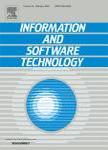版权所有:内蒙古大学图书馆 技术提供:维普资讯• 智图
内蒙古自治区呼和浩特市赛罕区大学西街235号 邮编: 010021

作者机构:Univ Paris Saclay CNRS SAMOVAR Telecom SudParis 9 Rue Charles Fourier F-91000 Evry France Russian Acad Sci Ivannikov Inst Syst Programming 25 Alexander Solzhenitsyn St Moscow 109004 Russia
出 版 物:《INFORMATION AND SOFTWARE TECHNOLOGY》 (信息与软件技术)
年 卷 期:2018年第103卷第Nov.期
页 面:138-141页
核心收录:
学科分类:08[工学] 0835[工学-软件工程] 0812[工学-计算机科学与技术(可授工学、理学学位)]
主 题:Program / code optimization Mutation (software) testing
摘 要:Context: A mutant is a program obtained by syntactically modifying a program s source code;an equivalent mutant is a mutant, which is functionally equivalent to the original program. Mutants are primarily used in mutation testing, and when deriving a test suite, obtaining an equivalent mutant is considered to be highly negative, although these equivalent mutants could be used for other purposes. Objective: We present an approach that considers equivalent mutants valuable, and utilizes them for source code optimization. Source code optimization enhances a program s source code preserving its behavior. Method: We showcase a procedure to achieve source code optimization based on equivalent mutants and discuss proper mutation operators. Results: Experimental evaluation with Java and C programs demonstrates the applicability of the proposed approach. Conclusion: An algorithmic approach for source code optimization using equivalent mutants is proposed. It is showcased that whenever applicable, the approach can outperform traditional compiler optimizations.